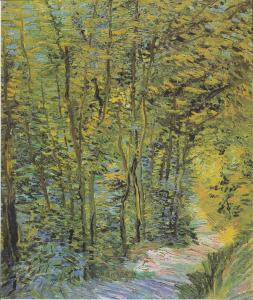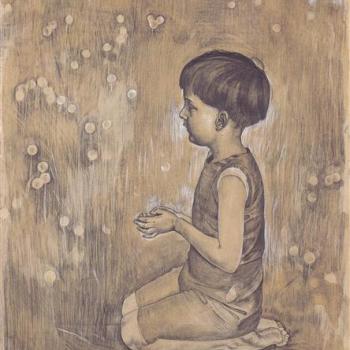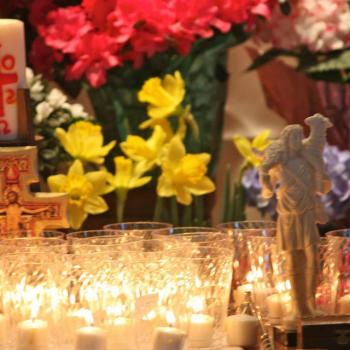
For Lent, the Fraternity of Communion and Liberation in the US has proposed that we read a text by Luigi Giussani, Morality: Memory and Desire. As I read, I’d like to share my reflections on this book in the hope that others might want to engage in discussion with me. If you search amazon, you’ll discover that you can buy a used copy for a mere $112 – a veritable steal! The translation of that edition is also outdated and quite difficult to read. So I will make certain to include quotations and to provide context so that you can follow what I say without having read the book.
Salvation
Salvation does not only concern the hereafter; it has to do with the whole person, the here and now as well as the hereafter: earth and heaven. It has to do with both because heaven means the truth of the earth made manifest. And the truth of the earth is Christ, as Saint Paul says in his Letter to the Colossians, given that “in Him all things hold together”.
Christ is the exhaustive meaning, the meaning of the clear, beautiful sky this evening, of my person, of our persons, of the whole world. To affirm that Christ is the Savior means to point out the path on which everything can be realized and fulfilled.
Time was given to us to educate this faith, to educate this awareness, to educate the recognition of His Presence. [Luigi Giussani, Morality: Memory and Desire, page 3]
The Whole Person/Here and Now
If our whole person – in the here and now – were not in need of salvation, the self-help industry would dry up. When I look at my own life, I see many things in need of salvation: the extent to which I think that things (a pair of leather pants, new knobs for my old dresser, more books, the ginormous tea kettle – six liter capacity! – I just bought, a flight out of town to anywhere but here…) will bring me real gladness; my intermittent panic over the idea that my friends might discover my faults and then abandon me; my lack of recent exercise; my messy, disorganized household and schedule and habits and basically everything about my “outer” life; that my mouth and arm still give me significant, daily pain; the myriad ways I fail to reach out to others; and my tendency either to rebel against reality or to react in fear to recent difficult or painful events. Of course, this list is incomplete.
A quick internet search would suggest I need 1. meditation tapes to overcome my desire; 2. psychotherapy to fix my abandonment issues; 3. a gym membership; 4. Marie Kondo to come here personally and fix my mess; 5. to get back onto painkillers; 6. any number of new books; and a webinar to teach me mindfulness.
To summarize: I need WAY more money.
The Truth (of Me)
Or maybe all the money in the world would not be enough to fix me.
This line, “the truth of the earth is Christ” causes me feelings of uncertainty, disbelief, and rebellion. Christ – who embodies beauty beyond my imagining, and a desire for me so profound and rich that his love breathes life into me – this Christ also lives the truth of myself and IS the truth of me? I can picture Christ outside of me, looking at me with love. But the truth of me is something inside of me, inside every cell and every moment of living. It feels somehow uncomfortable to allow something else to invade me, to become as intimate and all-pervading as my identity. To agree that Christ is the truth of me is to say, “I am thee and thou art me and all of one is the other. And feel now, thou hast no heart but mine” (Ernest Hemingway, For Whom the Bell Tolls) or as St. Paul writes, “No longer I, but Christ who lives in me.” Does anyone else experience this notion as uncomfortable? Perhaps in the throes of romantic love, in that instant when we are so magnetized by desire for union with the other that we would even trade our own interior truth for a taste of oneness, we might long to let go of our brutal loneliness. Most of the time, though, we value what makes us unique, impenetrable, different, inscrutable – even when our being apart from others causes us misery. We wonder what else we could have left if we were to forfeit what distinguishes us from everyone else.
Despite this undertow of discomfort, the possibility that my own truth could also be so strong and so true as to be truth itself gives rise to a wild hope in me. If I were to have no heart but Christ’s, think how I could love all things – and each singular aspect of every distinct thing – in the cosmos. Are we willing to sacrifice our distinct positions in order to see what Christ sees, with the gaze of truth? Am I brave enough to love so freely and prodigiously?
The Exhaustive Meaning of My Person
Here’s a question: does meaning exist outside the human mind (outside of my human mind)? Because if meaning inhabits a space outside of me, then seeking meaning involves becoming attentive to, absorbed by, and receptive to something outside – something other. How terrifying is that? Perhaps extroverts don’t find this idea shocking, but for those of us who get exhausted just looking at a photograph of a person, the suggestion that we must engage with people in order to understand ourselves can be quite distressing.
To engage with Christ means to engage with other people.
The sacraments educate us to the need to gather as “two or more” in Christ’s name, to recognize that we are parts of one whole Body (John 15), that we cannot baptize ourselves, that no matter how sorry we are, we cannot be reconciled to God without an intermediary person, and that we can’t achieve communion without the contributing “work of human hands.” Much as some would like to imagine themselves to be consumers who go to church as individual units in order to acquire their sacraments and leave, the liturgy asks us to beg to be made “one body, one spirit in Christ.” Knowing how hard-headed we can be, Christ also commanded us to “take and eat” his body: how could the fact that meaning comes from outside and penetrates us (and not the other way around) be any more concrete?
Salvation, then, is other people. These others give me my meaning and show me the truth of myself.
The Path on which Everything Can be Realized and Fulfilled
I have had many smoothies in the past, but when I began this year-long ordeal of hunkering down in survival mode to wait while my tongue heals, my only food came from bottled nutritional drinks. Then one day a friend, moved with pity for my inability to eat the hamburgers her husband had grilled, made me a smoothie. Though I couldn’t taste the blueberries, coconut milk, avocados, and mango in the cup she handed me, the knowledge that I was consuming these nutrient-dense foods fed me psychologically and emotionally, as well as physically. My friend had seen my need and had responded to it. Just as Jesus performed a miraculous feeding because he had been moved by pity by the crowd of followers, my friend’s compassionate gesture gave me a glimpse of the truth of myself as someone who is looked at, loved, and nourished. That first smoothie had a para-liturgical value for me.
Now I make myself two smoothies per day, but until an out of town guest came to my table on Wednesday, no one else had ever shared one with me. When I offered to prepare food for my guest, he said he wanted to eat what I was eating. A smoothie? Really?! He said sure. I felt a little awkward about preparing one for him because I had never actually tasted them and don’t know whether they’re any good; but when I offered him some honey, he said he’d have his just the way I have mine. With this simple gesture, my guest entered into my experience and put his finger into the nail marks of my own suffering. Always eating something different from anyone else at the table has caused me so much sorrow. Sometimes the situation makes me so sad that I purposely prepare my smoothies before or after family mealtime and then spoon them into my mouth while I read to distract myself. This past Wednesday, though, I tasted a form of convivial sharing that turned my smoothie into a true meal.
Time was Given to Us to Educate this Awareness
On Tuesday of this week, I could have never dreamed that my friend would ask to share a smoothie with me, nor could I have never anticipated how this gesture would wake me up, by responding to my need for companionship [etymology of companion: “c. 1300, “one who accompanies or associates with another,” from Old French compagnon “fellow, mate, friend, partner” (12c.), from Late Latin companionem (nominative companio), literally “bread fellow, messmate,” from Latin com “with, together” (see com-) + panis “bread,” from PIE root *pa-“to feed.”]. Now that it’s Friday, I can never remove this smoothie (nor the blueberry one that my first friend prepared for me) from who I am, from the truth of myself. These gestures have changed me by feeding me both literally and on a much deeper level.
Who knows what new adventure awaits me tomorrow?















